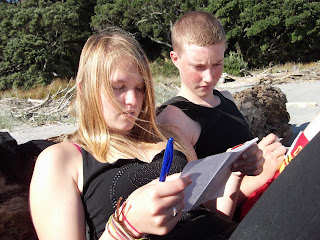We had a fabulous discussion about the characters in the Harry Potter books and movies and how they changed throughout the seven volumes. I couldn't believe how much these kids have remembered and how much they absorbed that I missed. Hihiri would probably score 100% in a Harry Potter knowledge quiz. Their teacher Kathryn is wondering whether they might have to go on a school outing to the new movie. Personally, I can't wait for Part 2 of Harry Potter and the Deathly Hallows.
Kathryn has proposed that the kids create a collection of short stories, get them illustrated and published, and sell them. It's a great idea. It will also prompt some tough decisions. Some kids are struggling to make progress in the middle of their stories. It's a tough part of the story. All writers sometimes have to abandon a story if it isn't strong enough to go the distance, but it's difficult to know when to give up on it. A couple of students have done that already and they've become inspired by their second idea. We're going to get on the computers tomorrow so we should start to see some of these stories springing into life.
A number of kids at Ngakonui Valley School are nearly finished their first draft, so some people read out their stories and we all made comments and suggestions about what we thought worked well and what we thought would make them even better.
The most common things were:
- Too much telling. Show more with dialogue and body language. Less narrative.
- Change the pace for the important bits. Add tension by changing the length of sentences, and use the senses to create mood and feeling.
- Use verbs like ambled or shuffled (good suggestion from Madison) rather than walked slowly.
- Reduce words like 'was', 'were', 'started to', suddenly, and 'then.'
- Avoid cliches. Try and think of an original way to describe something.










